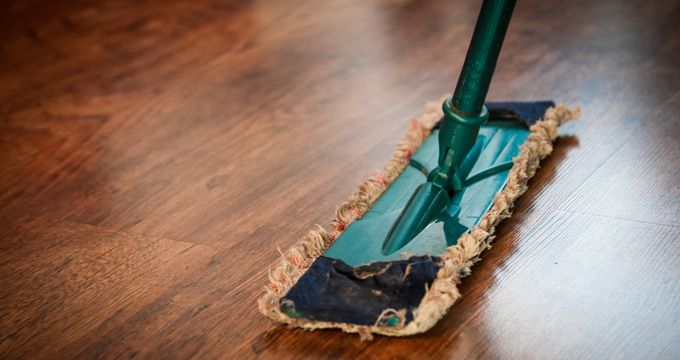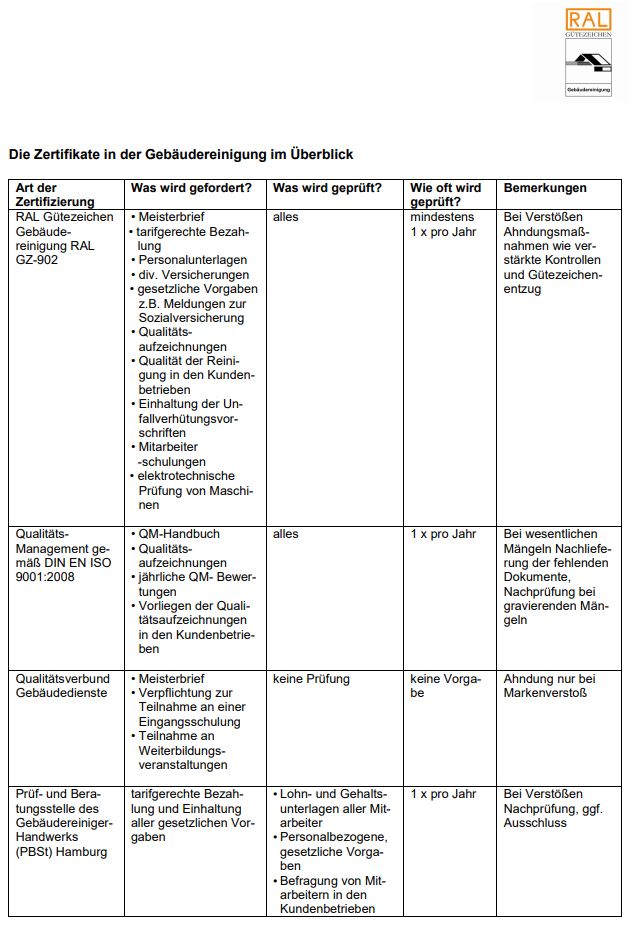
The cleaning industry is one of the most important service industries. Their employees mainly ensure a clean and pleasant working environment in offices. The cleaning industry also contributes to ensuring the necessary hygiene level in the food and high-tech industry, but also in hospitals, to name just the three most important examples of special activities in the industry.
There are various aspects in the cleaning industry, industrial cleaning (including hygiene in the food chain), special cleaning services (cleaning of hospitals, clean rooms, etc.), facade and window cleaning, cleaning of public transport and schools, etc. These services account for almost half of the industry’s total turnover. They all require both the use of sophisticated equipment and special staff training. In addition, there are also different cleaning requirements in different industries. The following article covers only some of these facets.
Legal foundations
Cleaning companies, as an employee-heavy industry, have to comply with many standards regarding employee protection. This is not the content of this article, but lists some of the important standards for cleaning itself. On the basis of these standards, we enter into the obligations placed on a cleaning company.
Standards in the cleaning industry
- Particularly important are the various DIN standards (German Institute for Standardization), which develop a standard and ensure standardization.
- In the international context, the ISO standards (International Organization for Standardization) and the European standards (EN) must be observed (https://standards.cen.eu/).
- Certification of quality management systems (the specifications and processes defined in advance by the company itself are checked)
- ISO 9001:2008 (only in force until September 15, 2018)
- ISO 9001:2015 (supersedes ISO 9001:2008, effective immediately)
- DIN EN 15221 Parts 1 to 6 (Standardization of terms and contents, products, services and properties, in particular Part 3, quality judged by hard, measurable characteristics and soft, tangible characteristics).
- DIN EN 13549 / ÖNORM EN 13549 (Ensuring environmentally friendly and -compatible cleaning, as well as the use of non-hazardous substances and preservation of the building’s structural substance, Europe-wide measuring system for the quality of cleaning services).
- ÖNORM D 2050 (Indicators for cleaning services depending on cleaning levels, room areas and room use and specifies the maximum square metre performance that employees have to perform depending on the activities and requirements of their employers).
- RAL GZ-902 Control of the product, e.g. the quality of cleaning or adherence to rates.
- In principle, contracting authorities are bound by the Procurement Regulations for Services (VOL)..
Procedure and procedure for implementing legal standards and requirements
The legal requirements mentioned in the previous section must of course also be implemented within the framework of a legally compliant organization. There is a best practice approach that we would like to present to you. This is divided into four simple steps:
- Object inspection
In order to identify all requirements, it is important to know your properties and customers. For this reason, a property inspection is a good idea. - Detailed planning
In detailed planning, you agree on a common service definition. The processes to be considered are identified – as are the technologies to be used. From the entrepreneur’s point of view, the principle of efficiency naturally applies, but the utmost caution should be exercised, because the higher the efficiency, the lower the demands and the possibility of meeting all requirements at all. - Define and train work processes
The identified processes must now be completed with individual process steps. Object-specific training courses for all employees ensure that there is a common understanding of how services are provided. Self and external controls guarantee a uniform standard of service for the services to be provided. Depending on the size of the object, foremen are available to answer questions. - Quality management system
The complete documentation and legally compliant proof is recorded within the framework of the quality management system.
In addition to this standardized procedure, there are also external control bodies that support the verification of compliance with all legal requirements: The member companies of RAL Gütegemeinschaft Gebäudereinigung e.V. are audited at least once a year by an independent institute. This control takes place in the member companies themselves but also in randomly selected cleaning objects.
Plan, Do, Check, Act (PDCA)
In its GEFMA Guideline 160 „Sustainability in Facility Management – Cleaning Assessment System“, the GEFMA (German Facility Management Association) has developed a PDCA cycle to improve quality controls in cleaning:
1. Planning of sustainability-optimized cleaning services (Plan)
- Standardized cleaning processes
- Cleaning register and cleaning schedule
- (Contractual) design of the cleaning service
- Quality standards and qualification
- Quality standards of the commissioned cleaning company
- Qualification of cleaning personnel and managers
2. Implementation of sustainability-optimized cleaning services (Do)
- Cleaning equipment and supplies
- Use of sustainable resources (cleaning equipment, working equipment, etc.)
- Use of sustainable operating materials (cleaning and maintenance products)
- Work preparation: Appropriate portioning of operating materials depending on performance
- Legal conformity of cleaning services
3. Quality inspection (Check)
- Excerpts CAFM systems
- Minutes, reports, correspondence
- Process descriptions, job descriptions / organisation chart / work instructions
4. Quality improvements (Act)
- Minutes, reports, decision documents, presentations, correspondence
- Exemplary proof for the elimination of sustainability deficits
Consequences of an detriment
Apart from the consequences of a breach of contract, there are different procedures for the client, depending on the certification of the cleaning company.
If the cleaning company is a member of RAL GGGR e.V., for example, it is possible to report a lack of cleaning services to the Quality Association. The Quality Association then decides how to proceed; it is possible to check the member company at short notice or – in serious cases – even have the quality mark revoked.
Sanctions for environmental pollution may also be threatened.
Competent authorities/contacts
At this point we would like to provide you with a list of the most important or most relevant contact points who can provide further information on the subject of rights and obligations in cleaning:
- World Federation of Building Service Contractors (WFBSC)
- European Federation of Cleaning Industries (EFCI, 18 EU Member States + Norway and Switzerland)
- FIDEN (Fédération Internationale des Entreprises de Nettoyage) International Association of Cleaning Companies
- RAL Quality Association for Building Cleaning e. V. (RAL GGGR e.V.) for remuneration in Germany
- Federal Guild Association for Building Services Providers
- Environment Federal Office
- GAV Cleaning sector in German-speaking Switzerland, generally binding
RAL-certificate of the building cleaners
The Gütegemeinschaft Gebäudereinigung e.V. has published a very useful collection of the most important certifications. The list below shows which certifications are possible for your company in the field of building cleaning:

Interesting Links
During the research for this article, we are interesting sources, which we do not want to withhold from you.
- Uniform FM understanding, basic standard DIN EN 15221-1/2
- New EU standard on standardisation of costs
- A guide for private and public organisations in awarding cleaning services
- Internet pages of the Industrial Association for Hygiene & Surface Protection, in which cleaning agent manufacturers are organized
- Source on the subject of cleaning and hygiene (unfortunately no longer quite up-to-date)
- A look through the jungle of standards (RAL)